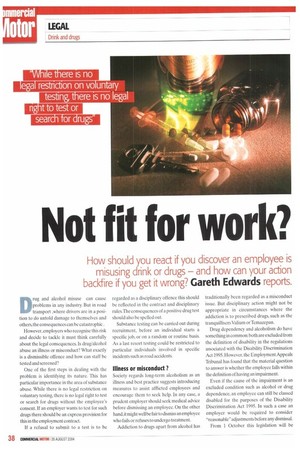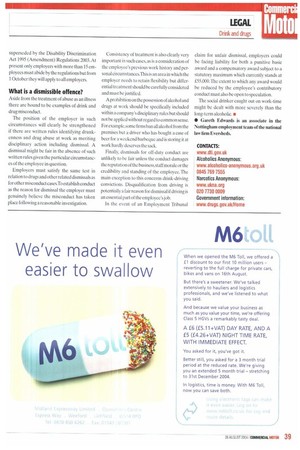Not fit for work?
Page 38

Page 39

If you've noticed an error in this article please click here to report it so we can fix it.
How should you react if you discover an employee is misusing drink or drugs — and how can your action backfire if you get it wrong? Gareth Edwards reports.
Drug and alcohol misuse can cause problems in any industry. But in road transport .where drivers are in a position to do untold damage to themselves and others, the consequences can be catastrophic.
However, employers who recognise this risk and decide to tackle it must think carefully about the legal consequences. Is drug/alcohol abuse an illness or misconduct? What exactly is a dismissible offence and how can staff be tested and screened?
One of the first steps in dealing with the problem is identifying its nature. This has particular importance in the area of substance abuse. While there is no legal restriction on voluntary testing, there is no legal right to test or search for drugs without the employee's consent. If an employer wants to test for such drugs there should be an express provision for this in the employment contract.
If a refusal to submit to a test is to be regarded as a disciplinary offence this should be reflected in the contract and disciplinary rules. The consequences of a positive drug test should also be spelled out.
Substance testing can be carried out during recruitment, before an individual starts a specific job, or on a random or routine basis. As a last resort testing could be restricted to particular individuals involved in specific incidents such as road accidents.
Illness or misconduct ?
Society regards long-term alcoholism as an illness and best practice suggests introducing measures to assist afflicted employees and encourage them to seek help. In any case, a prudent employer should seek medical advice before dismissing an employee. On the other hand, it might well be fair to dismiss an employee who fails or refuses to undergo treatment.
Addiction to drugs apart from alcohol has traditionally been regarded as a misconduct issue. But disciplinary action might not be appropriate in circumstances where the addiction is to prescribed drugs, such as the tranquillisers Valium or Temazepan.
Drug dependency and alcoholism do have something in common: both are excluded from the definition of disability in the regulations associated with the Disability Discrimination Act 1995. However, the Employment Appeals Tribunal has found that the material question to answer is whether the employee falls within the definition of having an impairment.
Even if the cause of the impairment is an excluded condition such as alcohol or drug dependence, an employee can still be classed disabled for the purposes of the Disability Discrimination Act 1995. In such a case an employer would be required to consider "reasonable" adjustments before any dismissal.
From 1 October this legislation will be superseded by the Disability Discrimination Act 1995 (Amendment) Regulations 2001 At present only employers with more than 15 employees must abide by the regulations but from 1 October they will apply to all employers.
What is a dismissible offence?
Aside from the treatment of abuse as an illness there are bound to be examples of drink and drug misconduct.
The position of the employer in such circumstances will clearly be strengthened if there are written rules identifying drunkenness and drug abuse at work as meriting disciplinary action including dismissal. A dismissal might be fair in the absence of such written rules given the particular circumstances of the employee in question.
Employers must satisfy the same test in relation to drugs and other related dismissals as for other misconduct cases.To establish conduct as the reason for dismissal the employer must genuinely believe the misconduct has taken place following a reasonable investigation. Consistency of treatment is also clearly very important in such cases, as is a consideration of the employee's previous work history and personal circumstances.This is an area in which the employer needs to retain flexibility but differential treatment should be carefully considered and must be justified.
A prohibition on the possession of alcohol and drugs at work should be specifically included within a company's disciplinary rules but should not be applied without regard to common sense. For example, some firms ban all alcohol from the premises but a driver who has bought a case of beer for a weekend barbeque and is storing it at work hardly deserves the sack.
Finally, dismissals for off-duty conduct are unlikely to be fair unless the conduct damages the reputation of the business.staff morale or the credibility and standing of the employee. The main exception to this concerns drink-driving convictions. Disqualification from driving is potentially a fair reason for dismissal if driving is an essential part of the employee's job.
In the event of an Employment Tribunal claim for unfair dismissal, employers could be facing liability for both a punitive basic award and a compensatory award subject to a statutory maximum which currently stands at £55,000. The extent to which any award would be reduced by the employee's contributory conduct must also be open to speculation.
The social drinker caught out on work-time might be dealt with more severely than the long-term alcoholic. • • Gareth Edwards is an associate in the Nottingham employment team of the national law firm Eversheds.
CONTACTS: www.dti.gov.uk Alcoholics Anonymous: www.alcoholics-anonymous.org.uk 0845 769 7555 Narcotics Anonymous: www.ukna.org 020 7730 0009 Government information: www.drugs.gov.uk/Home


























































































































































































